
Vintage Martin Stove Mid Century Gas Propane Log Fireplace Hearth Huntsvillle AL
May 7, 2023 admin 0 Comments
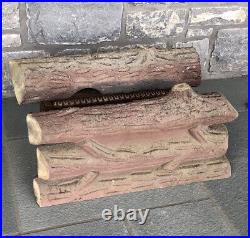
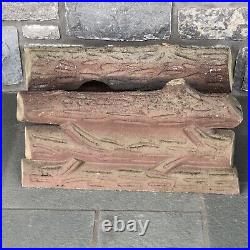
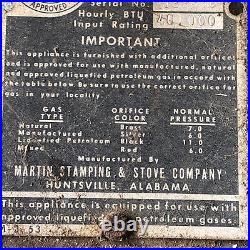
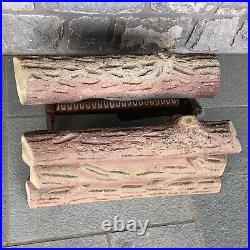
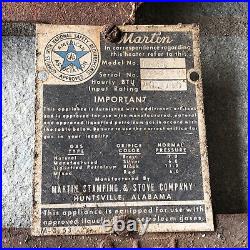
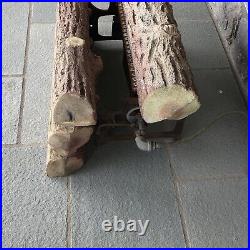
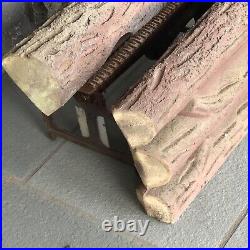
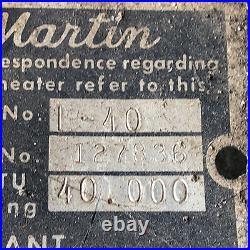
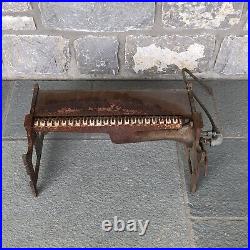
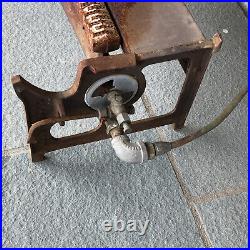
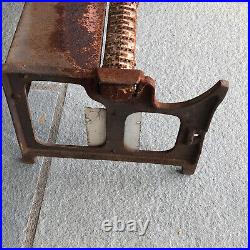
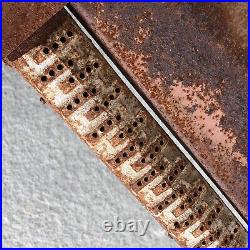
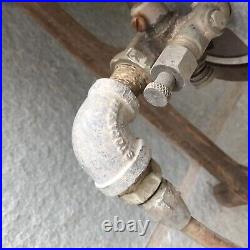
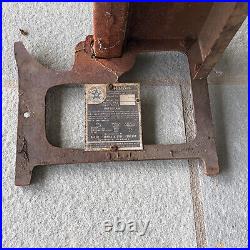
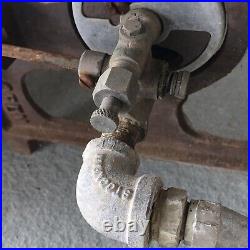
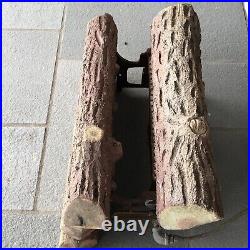
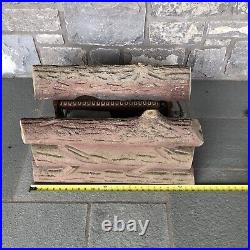

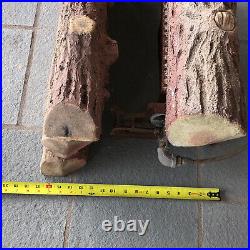
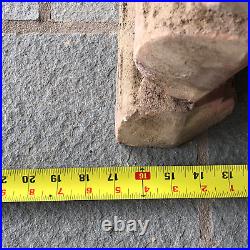
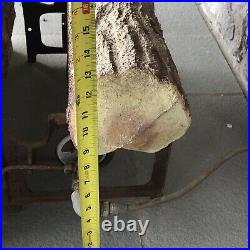
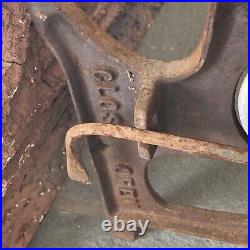
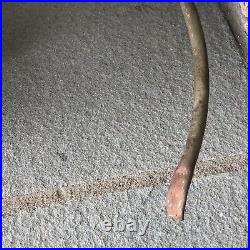
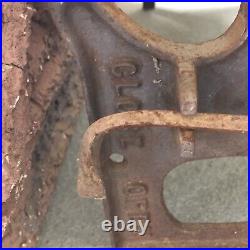

Martin Stamping and Stove Company Huntsville, Alabama. Removed from our families house. The house was built in 1957 and the logs have been in that same fireplace See photos VERY heavy. It was hooked up to a propane tank and uses propane gas. 27″ Wide x 17″ Deep x 13 Tall. 1905-41: Martin Brothers Establish Three Companies. It was in 1905, just after the turn of the 19th century, that two brothers, W. And Charles Martin, founded King Stove and Range Company, a small cast iron foundry in Sheffield, Alabama. The foundry made coal and wood heaters, cooking stoves and ranges. The brothers incorporated the acquired business as Martin Stove and Range Company, a separate business from King Stove and Range. There they made coal and wood stoves as well as gray iron castings. The foundry also turned out cast hollowware, iron skillets, and clothes-pressing irons known as “sad” irons. The Martins turned the operation into their third business, Martin Stamping and Stove Company, which began turning out a small line of unvented gas heaters. 1941-76: Martin-Owned Companies Diversify. During World War II, both of the Martins’ foundries manufactured magazine heaters for the Army, and Martin Stamping made bomb crates and other strategic materials. They would add electrical heating equipment in the late 1950s, when Martin Stamping and Stove began making a line of electrical heaters at its facility in Huntsville. Within just few years, demand for its electrical heaters led Martin Stamping and Stove to open a new plant, located in Athens, Alabama. It went into operation, in 1966, as the company’s Electric Heater Division. Also located in Athens, the Martin Fireplace Division began rapid growth, thanks in part to the introduction of Martin Firecones in 1968 and zero-clearance fireplaces in 1970. On January 1, 1974, the three companies making up the Martin holdings merged to form Martin Industries, Inc. Under the reorganization plan, operational control was combined, and in June 1976, the company’s executive team set up new central administration offices in Florence. In that same year, also in Florence, Martin Industries established a centralized engineering facility. 1977-90: Martin Expands Its Facilities and Acquires Other Companies. While the reorganization and structural changes were in progress, the Sheffield plant discontinued its foundry operations and was converted into a stamping and fabricating plant. In addition, the Florence plant was retooled into a highly automated foundry to meet Martin Industries’ casting demands as well as those of other client companies. Towards the end of 1977, it bought a plant located in Americus, Georgia, where, in 1978, it began producing its Ashley line of heaters. It also added a 200,000 square foot building in Huntsville. With the addition of that facility, formerly owned by Genesco, Martin’s total manufacturing and warehouse floor space reached 1.2 million square feet. The company’s expansion through acquisition continued in the early 1980s. Next, in 1982, it acquired the Sahara line from Hobart Manufacturing, which produced its dehumidifiers for General Electric. Martin then transferred the manufacture of Atlanta Stove’s products to its factories in Huntsville and Athens and moved its sales administration to offices in Florence. In a calculated strategy to decrease the impact of seasonal sales and thereby achieve a greater and more efficient use of its manufacturing capacity, in 1988 Martin acquired the NuWay line of utility trailer kits and, in 1990, the Broilmaster line of gas barbecue grills. Martin also diversified into a non-season market, even before acquiring Broilmaster. In the third quarter of that year, Martin incorporated production of the Filex desks and filing cabinets into its Sheffield and Huntsville plants. In 1990, Martin also expanded its gas heater lines when, in the same acquisition that brought Broilmaster into its corporate fold, it added the Warm Morning line of vented heaters to its offerings. 1992-96: Martin Establishes ESOP and Goes Public. Martin Industries finally went public in 1995, making an initial public offering (IPO) of 2.3 million shares of common stock. It entered the public sector in order to obtain funds for further acquisitions, make capital improvements, and develop new products. Among other things, the funds helped finance the company’s expansion in Canada. Early in 1996, it completed its acquisition of Hunter Energy and Technologies Inc. And its sister company, Ontario, Inc. By purchasing all the outstanding shares of the two corporations. In January 1997, Hunter Energy and Ontario merged to form Hunter Technology Inc. Hunter continued to operate in its 100,000 square foot plant located on a 12 acre site in Orillia, Ontario, manufacturing a line of gas space heaters and pre-fabricated fireplaces. In February 1997, Martin discontinued its manufacture of office furniture, bowing to increased competition and only marginal market success. In June of the next year, it also moved its production of gas grills, gas logs, and free-standing vent-free heaters from its facility in Washington Park, Illinois, to its Athens and Huntsville, Alabama facilities. In the fall of 1998, Robert L. Goucher replaced William H. Martin III as the company’s CEO and president, a move in part made because of Martin Industries’ need for some fresh strategic planning. Goucher came over from his positions as president and CEO of StarMark, Inc. A subsidiary of Masco Corporation. While at the helm of StarMark, and in previous executive positions he held with Ryobi North America, Goucher’s responsibilities included strategic planning as well as operations, sales, business development, and quality control. The late 1990s proved to be very troubling years for Martin Industries. The company’s financial setbacks compelled it to consider stringent counter measures, including the sale of some of its divisions. Goucher, quoted in an article in TimesDaily, indicated that “the year 1999 was very difficult for the company, its employees and stockholders, ” and further indicated that in 2000 the company was seeking means to restore its financial health. One option was to sell off some or all of its product lines. In 2000, Martin Industries still employed between 150 and 200 people in northwest region of Alabama known as the Shoals, about 400 at its Athens plant, and another 50 at its Canadian operation in Ontario. In that year, as part of its turnaround effort, it expanded its Sheffield operation to allow the plant to assemble gas fireplace log sets and utility trailers. The year also saw a change at the top when John L. Duncan replaced Goucher as president and CEO. Duncan, who had been a director of the company since 1999, was formerly the president and CEO of Murray Ohio Manufacturing Co. Goucher, although no longer involved in the company’s day-to-day operations, was still involved in planning strategic alternatives with the company’s investors. At the end of 2000, Duncan had to face expected but nevertheless very disappointing financial realities. However, with the exception of Broilmaster premium barbecue grills, sales for the company’s products fell across the board. In 2001, Martin, under Duncan’s tutelage, took several steps to counteract its sagging sales, including some belt tightening measures. Among other things, it moved its NuWay Trailer Division to its plant in Canada and discontinued assembling both utility trailers and log sets at its facility in Sheffield. The company was also planning some new strategic initiatives, including the option of divesting its Broilmaster Premium Gas Grill line in order to focus more sharply on its Hearth and Heating divisions. It was hoped that such measures would soon return the company to profitability. In Martin’s favor is the fact that it manufactures goods for a solid market with fairly predictable demands. However, each of the industry segments in which the company operates is cyclical, and its sales are affected by general economic cycles, consumer confidence, inflation, and other factors outside its control, such as the demand for new housing and the availability of financing. Furthermore, home heating product sales are seasonal in nature and are directly affected by weather conditions, so the company will always face risks beyond those inevitably imposed by industrial competitors. Part of Martin’s difficulties in 1998 and 1999 arose from the fact that sales of its heating equipment declined because those years had very mild winters, some of the warmest ever recorded by the National Oceanic and Atmosphere Administration. Still, Martin is not in a terribly volatile industry and does not face any looming threats from either new technologies or competitive industries. Its chances of getting back on a solid profitability track remained strong at the start of the new millennium, though just how long that might take was uncertain. Principal Subsidiaries:Hunter Technology Inc. Principal Competitors:Barbecues Galore Limited; CFM Majestic Inc. And his brother, Charles, found King Stove and Range in Sheffield, Alabama. 1966: Martin Stamping and Stove Company builds a new plant in Athens, Alabama, for the company’s Electric Heater Division. 1968: The company introduces Martin Firecones. 1970: Martin begins manufacturing and marketing zero-clearance fireplaces. 1974: The three companies held by the Martins merge to become Martin Industries, Inc. 1976: Company opens its Central Administration Offices in Florence. 1977: Martin buys a plant in Americus, Georgia. 1987: Martin sells its Florence foundry to former employees and acquires the wood and gas divisions of Atlanta Stove. 1988: Company acquires NuWay Manufacturing Co. 1989: Martin acquires Filex line of metal office furniture. 1990: Company acquires Broilmaster line of gas barbecue grills and Warm Morning line of vented heaters. 1993: Martin introduces its series of vent-free gas logs and fireplaces; company sells its Americus facility and its dehumidifier line. 1994: Company introduces line of free-standing, vent-free heaters. 1995: Martin goes public with an IPO. 1996: Company acquires Hunter Energy and Technologies Inc. 1998: Martin consolidates its manufacturing by moving part of its operation from Illinois to its plants in Athens and Huntsville. 1999: Martin sells its Ashley solid fuel heating division to United States Stove Company. 301 East Tennessee Street. Our mission is: (1) To provide our customers with the high quality products that we would expect as consumers. Martin’s emphasis on quality extends from the initial concept and product engineering through production and customer service. (2) To provide our employees with a working environment that is motivating and rewards them for achieving the company’s goals. Our employees are Martin’s key resources. (3) To provide our shareholders with an excellent return on their investment. Profits ensure continued growth opportunities for our company and our employees. History of Martin Industries, Inc. Based in Florence, situated in the northwest corner of Alabama, manufactures appliances and utility equipment in two industry segments: home heating and leisure and other products. Included are a variety of vented and vent-free gas furnaces and heaters as well as a wide range of gas logs, gas stoves, prefabricated gas and wood fireplaces, and gas inserts. Martin, which manufactures its lines at two plants, one located in Florence and the other in Ontario, Canada, markets its products through a variety of distribution channels in both the United States and Canada. An ESOP company since 1992, about a third of Martin is owned by its employees. This item is in the category “Home & Garden\Home Improvement\Heating, Cooling & Air\Fireplaces & Stoves\Decorative Logs, Stone & Glass”. The seller is “collectingathome” and is located in this country: US. This item can be shipped to United States.
- Shape: Rectangle
- Power Source: Propane Gas
- Color: Multicolor
- Custom Bundle: No
- Material: Oak
- Brand: Unbranded
- Type: Decorative Logs
- Number in Pack: 1
- Style: Traditional
- Country/Region of Manufacture: United States
- Room: Dining Room, Foyer, Home Office/Study, Kitchen, Living Room, Lounge
- Application: Fireplace
- Power: Propane Gas
